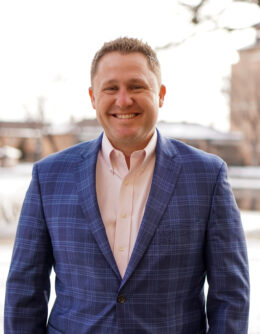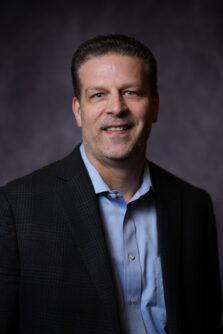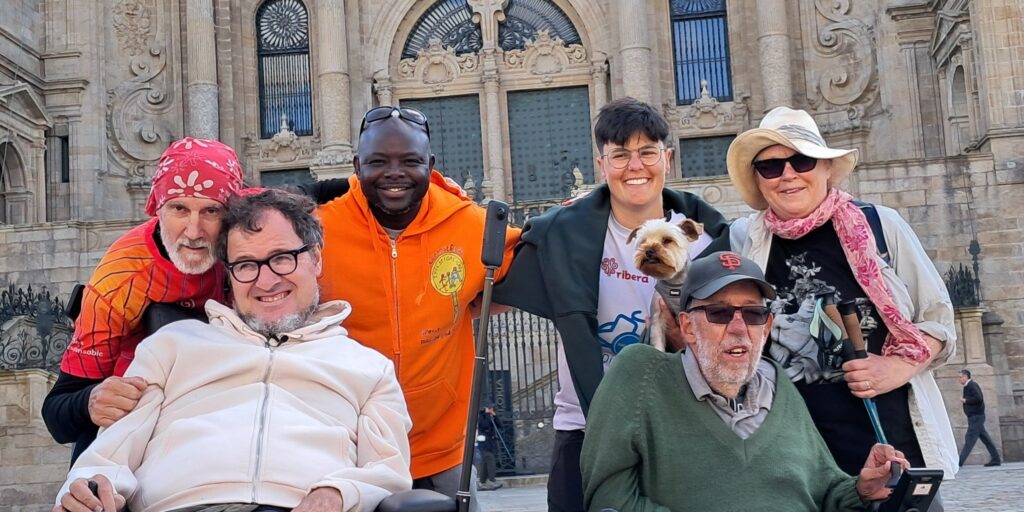
Employer Matching Programs Double the Impact
By Rebecca Hume | Monday, October 6, 2025
Anybody who has made a monetary donation to support MDA’s mission knows well that their dollars go a long way to change the lives of those living with neuromuscular disease. But what many might not know is that corporate matching programs create an opportunity to double that donation – and double the impact.
Companies with corporate matching programs offer to match, and sometimes exceed, individual charitable donations made by their employees. “Employer matching helps provide an impressive impact with little friction. From a business perspective, it’s an investment with outsized return – both in terms of community good and employee engagement,” says Kyle Francis, the Founder & President of Professional Transition Strategies (PTS). “From a cultural standpoint, it reinforces that we value what our people value. When leaders step up to match, it sends a powerful message about shared purpose.”

Kyle Francis, Founder & President of Professional Transition Strategies (PTS).
PTS is a Colorado based private dental practice transition advisory firm. The agency helps dental practice owners navigate the process of buying and selling practices or successfully finding a strategic partner. Their goal in business is to help others grow, succeed, and build a legacy – and that goal is paralleled in their commitment to community and philanthropy.
A man with a mission
For Todd Sheets, a Practice Transition Consultant who has been with PTS for three years, that commitment has significant meaning. As a long-time donor to MDA, Todd’s passion for MDA’s mission stems from his familial experiences with neuromuscular disease. With multiple generations in his family impacted by myotonic dystrophy, Todd values the opportunity to contribute to funding research and supporting a mission that provides hope for future generations.
“Throughout my life, I’ve seen firsthand the challenges and strength of the neuromuscular community,” Todd says. “MDA has been a source of support, advocacy, and hope. Donating each year is my way of giving back and standing behind the mission to fund research and care.” And when Todd learned of his company’s matching program, he jumped at the chance to increase support for that mission.
The culture of giving at PTS not only provides additional financial support to the causes that are important to its employees, but it also creates an environment where employees feel supported and community is paramount.
“We’ve built our company on the pillars of trust, integrity, adaptability and excellence. Those same principles guide our philanthropic efforts. We empower our team to give back in ways that are meaningful to them, and we match their generosity because we believe in amplifying their impact,” Kyle says. “When someone on our team supports a cause close to their heart, like Todd does with MDA, we want to stand beside them – not just in words, but in action.”
Exponentially increasing impact
When looking strictly at the numbers, employer matching doubles the impact of a donation. Progress, breakthroughs, and hope itself are increased with every dollar donated to MDA’s mission. The value and impact are undeniable. However, the impact of employer matching is multi-fold and goes beyond the dollars and missions.
When employers value philanthropy and making a difference in the lives of others, especially causes that are important to their employees, it creates a unified commitment to community and signals that their employees’ values matter. Additionally, matching programs can help motivate employees to take philanthropic action as they see the value of giving exemplified within their own company.

Todd Sheets, Practice Transition Consultant at PTS.
“When companies back the causes their people care about, it deepens employee appreciation and loyalty – and it shows real alignment between mission and action,” Todd says. “I believe that philanthropy and community support helps connect us to something bigger than ourselves. At PTS, we often talk about legacy. That applies not just to businesses, but to the lives we impact along the way. Giving back creates a domino effect, and I want to help be an agent of positive change. When people see their peers or companies contributing, it normalizes and stokes generosity. I think the people that live with that sort of abundance tend to live happier lives.”
Kyle echoes that sentiment, pontificating on the premise that philanthropy is truly much more than giving money. “It’s about standing for something beyond profit because it connects people to a shared sense of purpose. My team and I at PTS have seen how even modest donations – especially when matched – can scale into something significant,” Kyle says. “I also think that supporting our team in giving back isn’t just about being a good steward. It’s good leadership because it sets the tone for how we want to operate and our core values.”
Employer matching programs provide an impressive impact for the missions that they support, doubling the donation and doubling the impact. Kyle and Todd also believe that it’s an investment whose return is outsized both in terms of community good and employee engagement. At PTS, the employment matching program reinforces what they value and what their people value.
Cultivating a culture of giving
While many companies currently offer matching programs, those who don’t have these programs in place may be open to embracing the idea. Todd’s advice to anyone who is interested in approaching their own employer about creating a matching program is: don’t assume the answer will be no. If your company doesn’t have a formal program, your approach could be the first step towards starting one. He advises others to reach out to their HR managers to make the ask. He says to let your employer and company know why it matters to you. Sharing why the cause matters to you and the kind of impact your donation – and their match – could make is a powerful way to get your employer to consider your proposal.
Kyle advises those interested in approaching their employers about a charitable matching program to lead with their personal connection to the cause, sharing why the cause matters to you in a clear and simple ask. Noting that most business leaders want to support their teams, he urges others to start the conversation that just might spark a lasting program. And in addition to fulfilling the desire to support their employees, matching programs also help facilitate the development of a purpose-driven business and culture of good.
“It’s one of the most meaningful and efficient ways to build culture,” Kyle says. “Matching shows your team that you care about more than the bottom line. It boosts morale, strengthens retention, and helps define your company’s identity in the eyes of both your employees and the community. We built our charitable matching program because we want our team members to feel empowered to give back and care deeply about the causes that matter most to them.”
“Todd’s ongoing commitment to MDA is a powerful example of that. When someone on our team makes a personal investment in a deserving cause, we want to support that generosity and amplify it,” he continues. “Matching is one way to say, “We see you, appreciate you, and stand with you.”
And for Todd, the impact of both his donations and PTS’s matching donations to MDA is undeniable.
“I’ve seen the progression in both the research and the support networks through MDA. As a family affected by muscular dystrophy, we’ve felt the support firsthand,” Todd says. “I know that PTS and I are helping play a role in advancing treatment that will help change lives.”
Next Steps and Useful Resources
- Click here more information on how you and your employer can donate to MDA’s mission.
- Stay up-to-date on Quest content! Subscribe to Quest Magazine and Newsletter.
Disclaimer: No content on this site should ever be used as a substitute for direct medical advice from your doctor or other qualified clinician.




